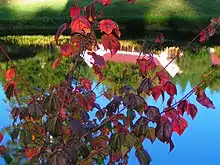| Acer pectinatum | |
|---|---|
 | |
| Acer pectinatum ssp. forrestii, branchlets and autumn leaves with reflecting water in the background | |
| Scientific classification | |
| Kingdom: | Plantae |
| Clade: | Tracheophytes |
| Clade: | Angiosperms |
| Clade: | Eudicots |
| Clade: | Rosids |
| Order: | Sapindales |
| Family: | Sapindaceae |
| Genus: | Acer |
| Section: | Acer sect. Macrantha |
| Species: | A. pectinatum |
| Binomial name | |
| Acer pectinatum Wall. ex G. Nicholson 1881 not Wall. ex Pax 1886[2] | |
| Synonyms[3] | |
|
List
| |
Acer pectinatum is an Asian species of maple that is native to the Himalayas and nearby mountains in southwestern China, Myanmar, and the northeastern part of the Indian Subcontinent.[4] It is a spreading deciduous tree up to 20 m (66 ft) tall in the wild,[5] with brown bark. The leaves are non-compound, leathery, up to 10 cm wide and 8 cm across, toothless, usually with 5 lobes but sometimes 3, the lobes toothed along the edges.[4] The leaves of mature trees turn brilliant shades of yellow and orange before falling off in autumn.[5]
Subspecies
- Acer pectinatum subsp. forrestii (Diels) A.E.Murray - Sichuan, Yunnan
- Acer pectinatum subsp. laxiflorum (Pax) A.E.Murray - Sichuan, Yunnan
- Acer pectinatum subsp. maximowiczii (Pax) A.E.Murray - see Acer maximowiczii
- Acer pectinatum subsp. pectinatum - Tibet, Yunnan, Bhutan, Assam, Myanmar, Nepal
- Acer pectinatum subsp. taronense (Hub.-Mor.) A.E.Murray - Sichuan, Tibet, Yunnan, Bhutan, Assam, Myanmar
References
- ↑ Chen, Y.; Oldfield, S. & Gibbs, D. (2018). "Acer pectinatum". IUCN Red List of Threatened Species. 2018: e.T193847A2285798. Retrieved 24 January 2023.
- ↑ Tropicos, Acer pectinatum
- 1 2 The Plant List, Acer pectinatum Wall. ex G.Nicholson
- 1 2 3 Flora of China, Acer pectinatum Wallich ex G. Nicholson, 1881. 篦齿枫 bi chi feng
- 1 2 "Acer pectinatum". Trees and Shrubs Online. International Dendrology Society. Retrieved 22 June 2021.
External links
- "Acer pectinatum". Plants for a Future.
- line drawing for Flora of China drawing 2 at bottom
This article is issued from Wikipedia. The text is licensed under Creative Commons - Attribution - Sharealike. Additional terms may apply for the media files.
